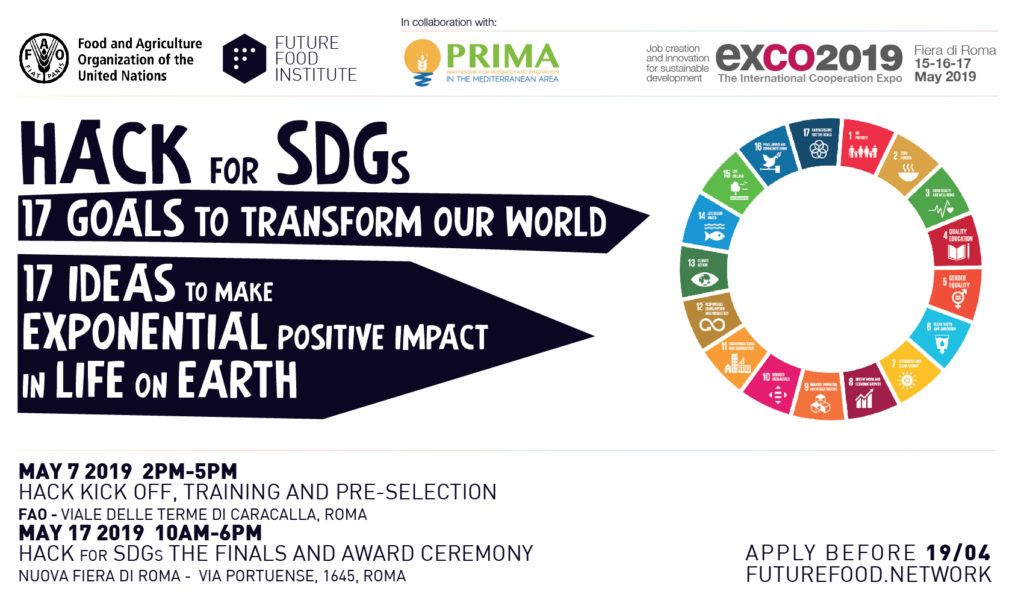Food and Agriculture Organization of the United Nations (FAO), Future Food Institute (FFI) and The Foundation for the Partnership on Research and Innovation in the Mediterranean Area (PRIMA Foundation), have jointly organized an International Hackathon on the Sustainable Development Goals (SDGs), to generate innovative solutions and ideas to face the global challenges.
The 10-day Hackathon started on May 7th at FAO headquarters and ended on May 17th at EXCO 2019, the first and only global expo dedicated to the innovative solutions provided by the actors of development cooperation.
More than 100 applications have been received, which have been categorized into three pillars: People; Planet and Prosperity.
After the first brainstorming, the main goals analysed have been: Goal 2, Zero Hunger; Goal 4, Quality Education; Goal 5, Gender Equality; Goal 11, Sustainable Cities and Communities; Goal 12, Responsible Consumption and Production and Goal 13, Climate Action.
The winners: Mwape K. Mubukwanu, Goal 2, with a project focused on sustainable nutrition in Zambia;
Manfredi Valeriani, Goal 4, with a storytelling digital platform named “Luisa” (in honor of Luisa Guidotti Mistrali, missionary and doctor who died in Zimbabwe) to learn about the 2030 Agenda through the personal stories of global shapers.
Eliot Gee, Goal 13, for a digital platform that connects farmers with scientists with the aim of fighting the climate crisis.
Roberto Ridolfi, Assistant-Director General of FAO’s Programme Support and Technical Cooperation Department is delighted about the interest this event has raised, in various countries, and the active participation it has generated from the different society actors, Universities and private schools for advanced studies, private companies, Governments, as well as United Nations.
This could really be the first international Hackathon on the SDGs, of this kind and nature, in fact, FAO, FFI and PRIMA are determined to do their best to integrate the ideas, innovative solutions and the proposals generated, into concrete actions and projects to support the SDG 2030 Framework.
Angelo Riccaboni added that “PRIMA and the Italian Secretariat of PRIMA contributed with great enthusiasm to the HACK on SDGs. Only through concrete solutions, the International Community will be able to reach the challenges of sustainable development. To actively engage researchers, young leaders and innovators in the implementation of Agenda 2030 is crucial to promote sustainable development and inclusive MED societies. PRIMA is on the frontline to that end“.
Sara Roversi, Founder of FFI “FFI has the mission to generate and accelerate impacts through food innovation. The 10 days Hackathon with FAO and PRIMA Foundation for achieving SDGs, that ended during EXCO 2019, has been a life changing experience for the 90 teams attending this marathon and will be even more powerful for the 3 winners who will be trained to become Climate Shapers, during our Summer School. This gives us the confidence that we are investing our resources in the best possible way: education for the future young leaders who will shape the climate crisis starting from ag-food tech. And this makes FFI a leading player in the Society 5.0., which must be human centered, responsible and hyper-connected for the prosperity of people and planet. In achieving this mission, no partner is better than FAO and PRIMA Foundation, the most credible gateways to create an impact. Innovation is a cooperative effort and we feel we are surrounded by the best global organizations to make it happen”.
Cristina Petracchi, Head of the FAO elearning Center stated that “it is though brainstorming and collaborative processes like this International Hackathon, that innovation is generated, we need fresh young unconditioned minds, to work together with the more experienced professionals to come up with sustainable solutions for our planet, to reduce food waste, improve the efficiency of food systems, use green energy, create gender and culturally sensitive societies where solidarity, integration and tolerance are a priority”.
The three winners have been granted a scholarship to attend the Future Food Institute “Future Food for Climate Change” learning program developed together with FAO e-learning center and supported by UN and and Youth Climate Leaders Network among others. The Summer Schools will train “climate shapers” in New York (USA) from July 10th to 17th, in Tokyo (Japan) from August 1st to 8th, and in Iceland from September 1st to 7th 2019.
For further information: https://futurefood.network/institute/summerschool
You can also find the article dedicated to the Hackathon on the Official Website of FAO following QUESTO LINK

